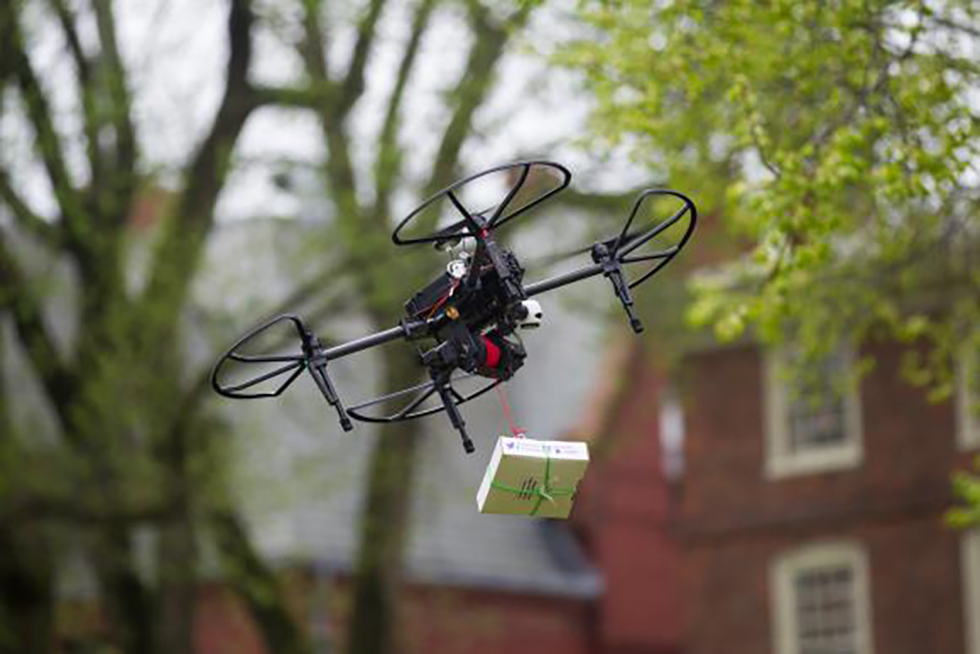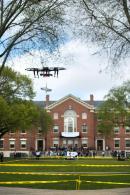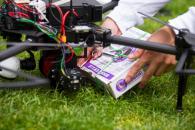
A cookie-bearing drone lifts off on Brown's College Green, demonstrating student-developed technology.
Credit: Photos by Nick Dentamaro
PROVIDENCE, R.I. [Brown University] — There were some very special deliveries made today on Brown University's College Green, as students and onlookers feasted on cookies flown to the steps of the Stephen Robert '62 Campus Center and dropped off via drone.
The event was the brainchild of two Brown undergraduates who are exploring technologies that might make commercial drone deliveries a reality. The goal was to demonstrate a patent-pending tethering system they've developed, which allows a payload to be lowered from a drone while the craft itself stays in the air.
 "For successful deliveries, there needs to be a safe and efficient way to lower packages to the ground," said Jacob Dyer, a Brown sophomore who developed the system with senior Aaron Zhang. "Our system works without the drone having to land and take off, minimizing energy loss and avoiding potentially hazardous landing areas."
"For successful deliveries, there needs to be a safe and efficient way to lower packages to the ground," said Jacob Dyer, a Brown sophomore who developed the system with senior Aaron Zhang. "Our system works without the drone having to land and take off, minimizing energy loss and avoiding potentially hazardous landing areas."
During their demonstration, Dyer and Zhang piloted their drone by remote control, delivering boxes of cookies from one end of the green to the other. They partnered with the newly opened Insomnia Cookies in Providence to provide the goodies, which were happily gobbled up by those in attendance.
The students say that while there's been a lot of talk about drone delivery, the idea has yet to truly get off the ground. Amazon and other companies are working on it, but no one is sure yet how such deliveries should work. At the moment, Federal Aviation Administration restrictions prevent commercial deliveries the fly over roads, buildings and people. Precautions were taken at the event to make sure none of those things happened.
"We think the regulations are totally appropriate," Zhang said. "A lot of things can go wrong. So we're developing this mechanism that we believe will increase safety overall."
 Dyer and Zhang recently landed a grant from Brown's Jonathan M. Nelson Center for Entrepreneurship to continue their work, which includes the possibility of developing their own drone. Currently, they're using an off-the-shelf craft that they've modified with their tether device. But they'd like to explore the possibility of a more robust machine.
Dyer and Zhang recently landed a grant from Brown's Jonathan M. Nelson Center for Entrepreneurship to continue their work, which includes the possibility of developing their own drone. Currently, they're using an off-the-shelf craft that they've modified with their tether device. But they'd like to explore the possibility of a more robust machine.
Ultimately, however, the jury is still out on whether they can eventually create a business of this.
"We plan to validate our technology first, then decide whether or not the regulatory and consumer landscape is ripe for us to compete with the larger players," Dyer said.
- Kevin Stacey